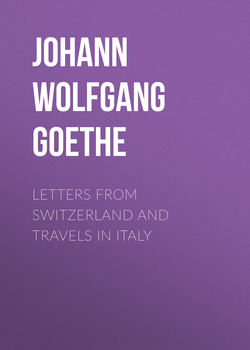Читать книгу Letters from Switzerland and Travels in Italy - Johann Wolfgang von Goethe - Страница 35
TRAVELS IN ITALY
FROM CARLSBAD TO THE BRENNER
ОглавлениеRatisbon, September 4, 1786.
As early as 3 o'clock in the morning I stole out of Carlsbad, for otherwise I should not have been allowed to depart quietly. The band of friends who, on the 28th of August, rejoiced to celebrate my birthday, had in some degree acquired a right to detain me. However, it was impossible to stay here any longer. Having packed a portmanteau merely, and a knapsack, I jumped alone into a post-chaise, and by half past 8, on a beautifully calm but foggy morning, I arrived at Zevoda. The upper clouds were streaky and fleecy, the lower ones heavy. This appeared to me a good sign. I hoped that, after so wretched a summer, we should enjoy a fine autumn. About 12, I got to Egra, under a warm and shining sun, and now, it occurred to me, that this place had the same latitude as my own native town, and it was a real pleasure to me once more to take my midday meal beneath a bright sky, at the fiftieth degree.
On entering Bavaria one comes at once on the monastery of Waldsassen, with the valuable domain of the ecclesiastical lords, who were wise sooner than other men. It lies in a dish-like, not to say cauldron-like hollow, in beautiful meadow-land, inclosed on all sides by slightly ascending and fertile heights. This cloister also possesses property in the neighbouring districts. The soil is decomposed slate-clay. The quartz, which is found in this mineral formation, and which does not dissolve nor crumble away, makes the earth loose and extremely fertile. The land continues to rise until you come to Tirschenreuth, and the waters flow against you, to fall into the Egra and the Elbe. From Tirschenreuth it descends southwards, and the streams run towards the Danube. I can form a pretty rapid idea of a country as soon as I know by examination which way even the least brook runs, and can determine the river to whose basin it belongs. By this means, even in those districts which it is impossible to take a survey of, one can, in thought, form a connection between lines of mountains and valleys. From the last-mentioned place begins an excellent road formed of granite. A better one cannot be conceived, for, as the decomposed granite consists of gravelly and argillaceous earths, they bind excellently together, and form a solid foundation, so as to make a road as smooth as a threshing floor. The country through which it runs looks so much the worse; it also consists of a granite-sand, lies very flat and marshy, and the excellent road is all the more desirable. And as, moreover, the roads descend gradually from this plane, one gets on with a rapidity that strikingly contrasts with the general snail's pace of Bohemian travelling. The inclosed billet will give you the names of the different stages. Suffice it to say, that on the second morning I was at Ratisbon, and so I did these twenty-four miles3 and a half in thirty-nine hours. As the day began to dawn I found myself between Schwondorf and Begenstauf, and I observed here a change for the better in the cultivation of the land. The soil was no longer the mere debris of the rock, but a mixed alluvial deposit. The inundation by which it was deposited must have been caused by the ebb and flood, from the basin of the Danube into all the valleys which at present drain their water into it. In this way were formed the natural bolls (pölder), on which the tillage is carried on. This remark applies to all lands in the neighbourhood of large or small streams, and with this guide any observer may form a conclusion as to the soils suited for tillage.
3
A German mile is exactly equal to four English geographical, and to rather more than four and a quarter ordinary miles. The distance in the text may, therefore, he roughly set down as one hundred and four miles English. [A. J. W. M.]
